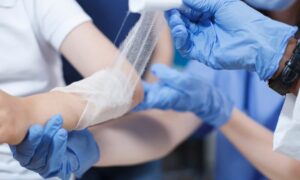Professional Surgical Incision Wound Care in Rockwall, TX

Surgical wounds are incisions that surgeons make to conduct operations. While modern surgical processes make it possible to create smaller wounds with precision tools, surgeries still require incisions that can be slow to heal or prone to infection. Depending on the circumstances of your operation, there may be any of four types of wounds:
- Clean (Class I)
- Clean-contaminated (Class II), which are clean but more vulnerable to infection
- Contaminated (Class III), which may have been contaminated before surgery
- Dirty-contaminated (Class IV), which are wounds exposed to fecal matter
Each of these wounds can be treated and go through the typical healing process of hemostasis, inflammation, proliferation, and then remodeling. However, they may undertake this process very slowly, which can present health and recovery risks.
Image Credit: DC Studio // Shutterstock
Causes of Slow or Non-Healing Surgical Wounds
There are many different potential causes of slow or non-healing surgical wounds. Your medical professionals can help evaluate the risks prior to some surgeries and present you with recovery plans along the healing journey. Common causes can include:
- Infection, which is characterized by swelling, redness, and draining fluid
- Poor circulation
- Underlying conditions such as diabetes, obesity, immunosuppressive diseases, or vascular disease
- Excessive pressure or additional trauma
- Reopened wounds
- Unhealthy behaviors such as smoking
Comprehensive Wound Assessment
Medical professionals conduct thorough wound assessments, and they can evaluate slow-healing wounds to determine causes and treatments. First, doctors might visually evaluate the wound size and visible complications to diagnose potential causes like infections or reopened wounds. A physical examination can help identify many of the causes behind non-healing wounds. However, deeper evaluations may be necessary if there are compound factors or if they believe an underlying medical condition may be present. They can also conduct diagnostic tests, including blood tests, bacterial cultures, or the use of imaging tools, to find signs of infection, underlying chronic conditions, or less visible damage.
Advanced Treatment Options
Once your medical team has a diagnosis, they can begin assessing different treatment options to speed up recovery and address underlying conditions. Common treatments include:
- Wound Cleaning and Debridement: This process can help remove sources of infection and reduce the risk of subsequent infections. Wounds should be cleaned if infection is present or if you accidentally reopen a wound. Surgeons may also remove dead tissue if it’s interfering with the healing process.
- Specialized Dressings: Depending on the size and severity of the surgical wound, it may need one of several different dressing options. Doctors might add antimicrobial materials, hydrocolloid dressings, or foam dressings to keep the wound closed and protected from the environment.
- Negative Pressure Wound Therapy (MPWT): This is a suction-based therapy that removes fluids and debris from around a wound to reduce swelling and help new tissue grow. It’s also called vacuum-assisted closure (VAC).
- Hyperbaric Oxygen Therapy (HBOT): Increased oxygen concentration can promote better healing. Medical professionals may increase the oxygen supply to a wound to either speed up initial healing or treat slow healing.
Personalized Recovery Plans
Everybody responds to surgery differently, including the initial response to incisions and throughout the entire healing journey. Doctors can use a wide array of advanced treatment options to treat slow healing and make recovery as seamless as possible. The right recovery plan can help. At United Wound Care Centers of Rockwall, we develop personalized plans that accommodate your body’s needs, your lifestyle, and best practices. Your personalized recovery plan will include:
- Pain and infection management: OTC or prescription medications and antibiotics can help abate pain and mitigate infection risks. Doctors can also show proper wound hygiene and care for the best results.
- Lifestyle modifications: Being too active or having an unhealthy diet can slow recovery. Your doctor will emphasize the importance of hydration and nutrition. They will also recommend not smoking or overstraining yourself.
- Ongoing monitoring: As your recovery progresses, it’s important to have your doctor check your wounds and the rate of recovery. Your recovery plan may also change as the wounds heal. You can also schedule checkups if you’re worried about complications.
